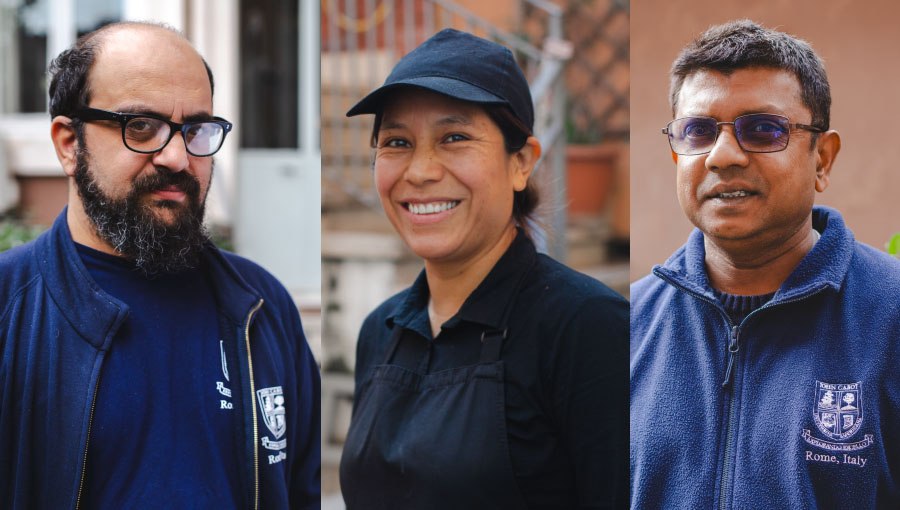Humanisms and Beyond: JCU Professors Conti and Sorgner Present Book at JCU
On June 20, 2023, the book Humanism and Beyond: Past Present and Future of the Humanities in Liberal Arts Education (Trivent, 2023), co-edited by JCU Professors Fabrizio Conti and Stefan Lorenz Sorgner, was presented at John Cabot University. The publication of the book was part of the celebrations for JCU’s 50th anniversary.

In his opening remarks, President Pavoncello, who also wrote the foreword, emphasized the importance of a volume that deals with issues of relevance to the mission of John Cabot University as a liberal arts institution. He also congratulated the editorial enterprise because it brings together the ideas and viewpoints of various members of JCU’s Department of History and Humanities.
Next, the contributors to the volume took the floor and briefly illustrated their contribution: Professor Danica Pušić offered a reflection on the concepts of paideia and humanitas, Professor David Levy discussed the role of Plato in the definition of liberal education, and Professor Fabrizio Conti pointed to the traditional uses of Humanism and to its pedagogical relevance within the liberal arts. Professor Brunella Antomarini explained the prehistory of cybernetics in Leibniz, and Professor Dario Biocca discussed the humanistic legacy of Silvio Pellico and Antonio Gramsci. Lastly, Professor Andrea Lanzone discussed the theme of humanism and attention to those in need in the singer-songwriter Fabrizio De André, and Professor Stefan Lorenz Sorgner reflected on the metahumanities and post-humanistic discourses.
A lively debate followed the talks, with wide participation from students who showed great interest in the topics discussed. The centrality of the humanities in the liberal arts system was highlighted, with the role of the humanistic tradition along with them, as well as the need to open up to future perspectives and new tools that make research and teaching increasingly up-to-date. The perspective that remains at the heart of the liberal arts as a whole is the capacity for dialogue, openness, interdisciplinarity, and critical thinking that the humanities as disciplines can help to foster and develop through a serious understanding of the past as well as reflection on the diachronic shaping of patterns, models, and ideas.
Fabrizio Conti (PhD, Central European University, 2011) is a lecturer in History at John Cabot University and an Arts and Humanities Advisor at the American Academy in Rome. His teaching and research interests span the late antique, medieval, and Renaissance periods, with an interdisciplinary approach to cultural and religious developments and a special focus on the history of magic and witchcraft. His publications include the monograph Witchcraft, Superstition, and Observant Franciscan Preachers: Pastoral Approach and Intellectual Debate in Renaissance Milan (Brepols, 2015) and the edited volumes “Nemo Non Metuit”: Magic in the Roman World edited with Elizabeth Ann Pollard (Trivent, 2022), and Civilizations of the Supernatural: Witchcraft, Ritual, and Religious Experience in Late Antique, Medieval, and Renaissance Traditions (Trivent, 2020), with a Foreword by Teofilo F. Ruiz.
Stefan Lorenz Sorgner is a philosophy professor at John Cabot University in Rome and is director and co-founder of the Beyond Humanism Network, Fellow at the Institute for Ethics and Emerging Technologies (IEET), Research Fellow at the Ewha Institute for the Humanities at Ewha Womans University in Seoul and Visiting Fellow at the Ethics Centre of the Friedrich-Schiller-University in Jena. He is editor of more than 10 essay collections, and author of the following monographs: Metaphysics without Truth (Marquette University Press 2007), Menschenwürde nach Nietzsche (WBG 2010), Transhumanismus (Herder 2016), Schöner neuer Mensch (Nicolai, 2018), Übermensch (Schwabe 2019). In addition, he is Editor-in-Chief and Founding Editor of the Journal of Posthuman Studies (a double-blind peer-review journal, published by Penn State University Press since 2017).





